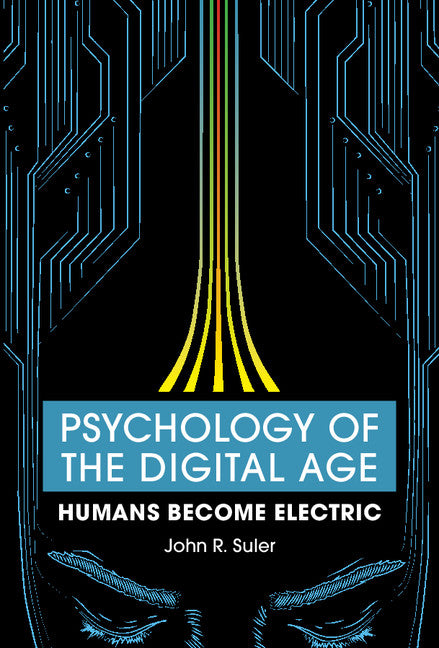Freshly Printed - allow 6 days lead
Couldn't load pickup availability
Psychology of the Digital Age
Humans Become Electric
Drawing on years of online research, this book presents key principles of life and wellbeing in the digital realm.
John R. Suler (Author)
9781107128743, Cambridge University Press
Hardback, published 18 November 2015
250 pages, 6 b/w illus.
23.5 x 15.7 x 3.1 cm, 0.77 kg
'… Psychology of the Digital Age is a comprehensive and subtle exploration of the various ways that online technology is disputing norms of interaction, behaviour and identity. Professor Suler has done an excellent job of setting out a clear framework for future discussion and exploration of these subjects in a way that will be beneficial and fascinating to both professionals and laypeople, and to whom it is highly recommended.' Gareth Southwell
Based on two decades of participant-observation field research in diverse online environments, this engaging book offers insights for improving lifestyles and enhancing wellbeing in the digital age. John R. Suler, a founder of the field of cyberpsychology, explains its fundamental principles across a wide variety of topics, including online identity management, disinhibition, communication via text and photographs, intimacy and misunderstandings in online relationships, conflicting attitudes toward social media, addiction, deviant behavior, virtual reality, artificial intelligence, and media overload. He provides a new framework, the 'Eight Dimensions of Cyberpsychology Architecture', which researchers, students, and general readers interested in cyberpsychology can apply as a valuable tool for creating and understanding different digital realms. Psychology of the Digital Age focuses on the individual, shedding new light on our conscious as well as subconscious reactions to online experiences and our intrinsic human need to self-actualize.
List of figures
Foreword
Preface
Acknowledgements
Introduction: newborns in evolution
1. Cyberpsychology architecture
2. Presence: be here now
3. The dynamic digital psyche
4. The disinhibited self
5. Electrified relationships
6. Other than you think: interpersonal perceptions
7. Text talk
8. Image talk
9. I, avatar
10. One of us: groups and communities
11. Change and excess
12. Addicted or devoted
13. The digital deviant
14. Synthesized realities and synthesized beings
15. Electric therapeutics
Conclusion: research and the researcher
References
Index.
Subject Areas: Popular psychology [VSP], Computer science [UY], Psychology [JM]


